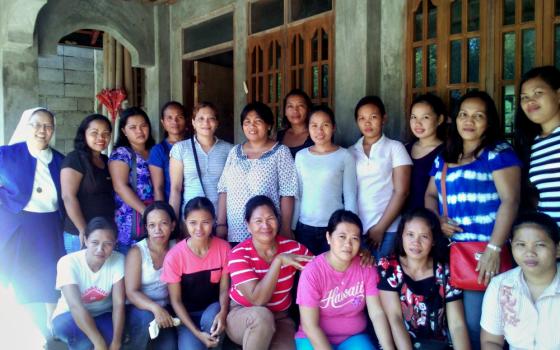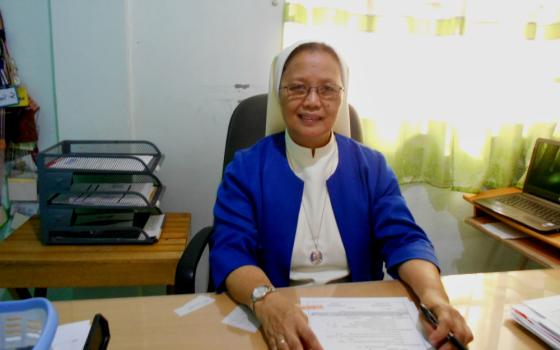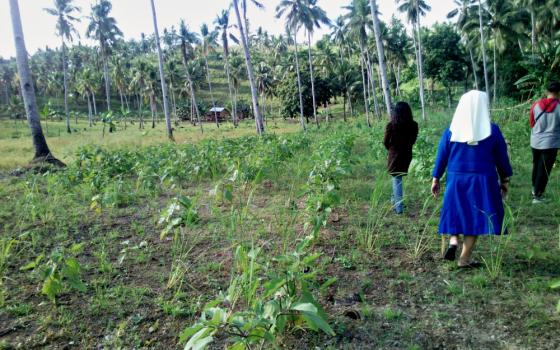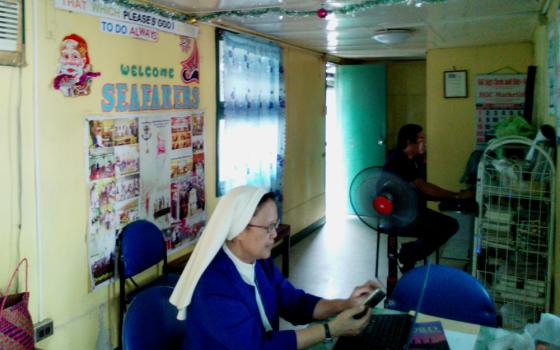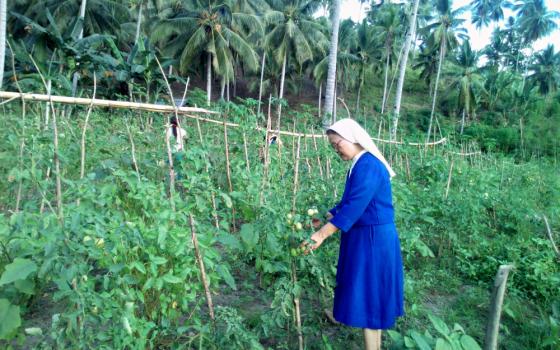Among a gathering of 17 other women, Lielanie Malinao shared how her life changed after becoming a facilitator of self-help groups in the province of Sarangani on the southernmost tip of the Philippine island of Mindanao.
She used to depend on just her monthly salary of 200 pesos (US$4) as a government dental health worker. But the initial group she joined taught her the importance of saving money, budgeting and other life skills. She now facilitates seven groups.
"Before, I had no real direction in life — I didn't plan things," she said. "I learned how to set goals and focus on meeting that goal."
Rural women like Malinao in the southern Philippines gain self-confidence, financial independence and friendships through self-help groups initiated by the Hesed Foundation of the Notre Dame Sisters in southern Philippines. The groups initially form to help women save money but evolve into lending programs and continue as support groups.
Like the other women at this meeting, Malinao works with Hesed to help set up groups in return for a minimal honorarium and transportation allowance, which was not covered in her previous work.
"I was nervous when I first entered a village because you don't know how people will react," said Malinao, a community development facilitator. "I needed patience, to know how to listen, how to give advice when they need help."
The self-help groups are part of a network of ministries run by the Oblates of Notre Dame Sisters, who in 1999 decided to consolidate their social services into Hesed Foundation to centralize funding and programs.
Taken from an Old Testament word meaning "loving kindness," hesed describes how God relates to his people. The Hesed Foundation has the local bishop on its board and works with local governments.
Hesed has programs in the region that include gender-rights-based advocacy, assistance to seafarers through Apostleship of the Sea, child and community development, community peace promotion, protection and sustainability of indigenous people's lands, and access to cheap and quality medicine through a pharmacy.
As of September, Hesed Foundation has 47 full-time staff members, of which seven are program coordinators and 12 are project officers.
"We help those who are in the farthest places, at the margins where no one dares," says Sr. Susan Bolanio, 63, executive director of the foundation.
She became an Oblate of Notre Dame in 1978 and worked in the order's schools and various ministries. She has worked in social justice ministry since 1990 and has led campaigns to help indigenous peoples gain access to and control of their ancestral lands, fight against open-pit mining, and promote peace and security on Mindanao island.
Advocacy work should be integrated with development programs, said Bolanio. Consciousness-raising and awareness seminars will not fully work without livelihood and economic activities that will improve people's financial status, especially that of women. The desire is to empower indigenous and Muslim women "who are totally dependent on their husbands, especially for income. [Some of them] do not dare criticize their husband in case he withholds funds from them," Bolanio said.
For Bolanio, who is from southern Mindanao, one of the most effective programs for women is the self-help groups. As of July 2017, there are about 1,894 women who are part of 101 self-help groups that Hesed Foundation has helped organize in Kiamba, an agricultural municipality in Sarangani Province.
Experienced members like Malinao help start other groups in nearby communities. For more remote and mountainous communities, Hesed staff members talk with women about starting a small group, usually five to six women, whose members commit to save money and pool it together weekly.
The women help each other maintain some savings, even if they are only contributing one peso a week. When there is enough money, a member can borrow from the collected funds and pay it back with minimal interest agreed upon by the group.
The group can also use the pooled money to start a small business, such as buying rice and canned goods from the town center and selling to neighbors, saving transportation costs, which can be high in remote areas.
Bolanio explained that the lock box that each group uses to collect money "should be empty, because this means that the money saved by the group is being used by the members through loans for different purposes." She said that what is left in the box, and not allowed for loan, is the emergency fund they have as a group or saved by an individual. She added that the average weekly savings of one member is about 30 pesos.
Joeffy Valdez said that she used to just stay at home while her husband went out to fish. She said she was so shy that she would give away the fish instead of selling them. "Joining the SHeG helped me learn to face people, to understand them and how to react to their problems," Valdez said, using the local term "SHeG," for "self-help group" to describe it.
Having a pool of money that members can access for financial needs or emergencies is a big help, she added, because they do not need to find collateral for a loan, which may be required in borrowing from a neighbor.
The women also gain support from each other with domestic issues. Several women had tears in their eyes as they described their lives before joining the group. Melba Tandi shared that she couldn't fully rely on her husband. Now, she said, "you're not scared because you have someone to go to, especially if you have problems with your family."
Bolanio said that they have assisted at least one woman in filing a case of domestic abuse against her husband after she shared about it to her group.
The foundation rents a two-bedroom house in Kiamba where one social worker and five staff members live on a rotating basis, since they live one to two hours away and don't have personal cars. The house also serves as an office to coordinate the foundation's various programs and a meeting place where community facilitators give updates on groups.
According to Marino Alicaway, each group is required to have a weekly meeting and community facilitators (grouped according to geographical area) meet with staff members monthly. Alicaway is assigned in Kiamba and is the program coordinator of the Hesed Child and Development Program, which has four other staff members, two men and two women.
Key to the success of the program is the connection built through conversation. "What do you have in the [lock] box? Without relationships and trust, the money is meaningless," he said, adding, "Money ends up the last thing they talk about."
However, organizing women in southern Philippines can meet with some resistance from various local officials. Manuela Pilotos said that when Hesed's program coordinator encouraged her to form five groups so that she could become a community facilitator, she was initially accused of promoting the causes of Muslim or communist rebels by police who noticed her going house-to-house in the different communities.
Others shared that they were questioned whether the money they saved was going to be used to buy weapons for the communist rebels.
Bolanio said that much depended on whether the town or city mayor welcomed the foundation's programs in their area. Some mayors would schedule their own activities at the town center when they knew that the women's groups were having a trade fair or general meeting, she said.
Police or military may raise questions because the communities the women visit are in far-flung areas, some in the mountains where communist rebels are known to hide, she added.
Mindanao and its surrounding smaller islands consist of 27 provinces, which are further grouped into five administrative regions and the Autonomous Region in Muslim Mindanao. Though rich in natural resources, four out the top five poorest regions in the Philippines are in Mindanao, with the whole area averaging a poverty rate of 42 percent compared to the national average of 26.3 percent in 2015.
Parts of Mindanao have experienced some form of armed conflict on and off for decades between government forces and communist rebels or different Muslim separatist groups. In 2017, Marawi City in northern Mindanao was occupied by a local group aligned with the international Islamic State terrorist network. Government forces took five months before President Rodrigo Duterte declared the city liberated on Oct. 17. The whole island continues to be under martial law.
For Bolanio, her nearly 30 years of experience in social justice ministry have led her to think of a framework for empowering women. "I thought of kiss, that is K.I.S.S.," which she said stands for:
- Knowledge: "We need to provide women with rights-based knowledge and information that improves their skills," Bolanio said. She cited a law against violence against women and children passed in 2004 and a women's rights law enacted in 2008, as two key elements they include in their training seminars.
- Income, so that women are not completely dependent on their husbands for money. Aside from the self-help group, Hesed encourages women in their programs to use their gardens and backyards to plant vegetables that will not only be a source of food and nutrition for their families but can also produce income. Bolanio said she came up with F.A.I.T.H. as a memory aid for participants — "food always in the home" — to encourage them to grow vegetables for their children's nutrition or to be sold to generate income.
- Services of the government: The foundation helps rural women who may feel intimidated to navigate government bureaucracy so they can avail themselves of free health services, social welfare benefits, and even receive free seedlings from the Department of Agriculture for their vegetable gardens.
- Support group: "Women need practical and emotional support," said Bolanio. "Some of the indigenous people only studied until around 8 years old. Many of them cannot or can hardly read. But they learn to stand in front of local officials to speak because of their SHeG experience."
For Bolanio, it is important that when someone comes to their foundation for help, even if they cannot address that person's specific concern directly, the person should not leave without getting something, even if it is an expression of support.
Malinao said she has gained confidence and enjoys monitoring activities as a community facilitator of groups in her area. "I chat with them, learn about their problems and what they need. In the process, I find my problems disappear, because if you are kind to other people they will be kind as well."
[Charity Durano is a correspondent for GSR based in the Philippines.]
About the Oblates of Notre Dame Sisters
The Oblates of Notre Dame Sisters were established in 1956 in Cotabato City, southern Philippines, by Missionary Oblates of Mary Immaculate Frs. George Dion and Gerard Mongeau. (Both priests later would become bishops of their respective dioceses in southwestern Mindanao.) Though primarily based in Mindanao, the congregation has mission houses in Japan, Papua New Guinea and the United States. According to the 2016-17 Catholic Directory of the Philippines, there are 171 Notre Dame sisters, three of whom are Papuan nationals. The sisters serve in parishes and hospitals, run formation and retreat houses, and own several schools, aside from their various social service and justice ministries.
